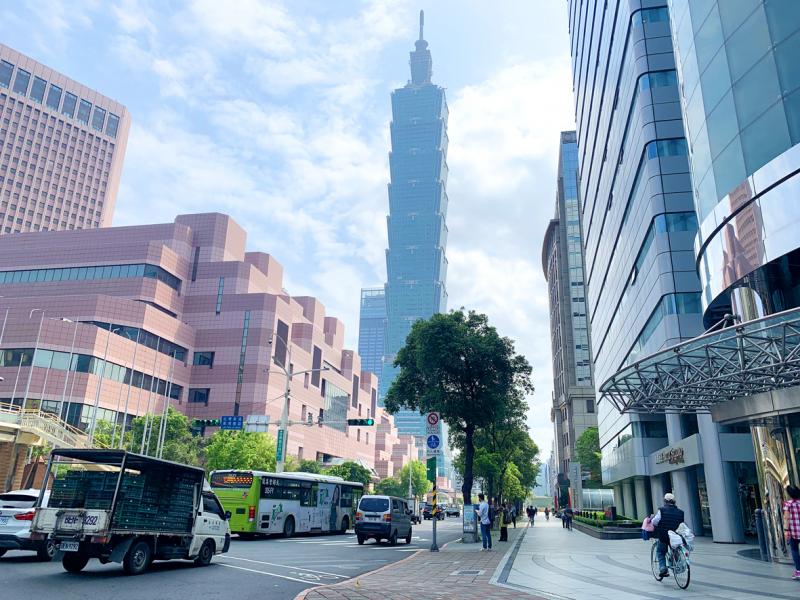Taipei is to designate three transportation hubs and six tourist hotspots as “Phase One Air Quality Management Zones,” with the types of vehicles allowed to enter them restricted, the Taipei Department of Environmental Protection said in a news release yesterday.
Vehicle owners and drivers failing to meet emission standards in those zones would be subject to fines from next year, the agency added.
Starting from Jan. 1 next year, large diesel vehicles would need to be certified and bear the government’s “Premium Self-management Logo,” showing that the vehicle’s emissions are in line with government standards, before they could enter the zones, it said.

Photo: Kuo An-chia, Taipei Times
Scooters failing to undergo the required regular inspections would also lose access to the zones, the agency added.
The air quality management zones would be Taipei City Hall Bus Station, Taipei Bus Station and Nangang Bus Station, as well as Yangmingshan National Park, the National Palace Museum, Chiang Kai-shek Memorial Hall, Sun Yat-sen Memorial Hall, the National Revolutionary Martyrs’ Shrine and Taipei 101, it said.
Offenders would receive verbal warnings throughout January, but from February they would face fines of NT$500 to NT$2,000, depending on their vehicle type, with a maximum fine of NT$60,000, it added.
Many cities in other countries, such as Berlin, Amsterdam, Stockholm and London, have implemented similar regulations to curb pollution, the agency said, citing London’s Ultra Low Emission Zone as an example.
The agency is introducing the regulations — the first in the nation — as diesel engine exhaust has been classified as being “carcinogenic to humans” by the WHO, Air Quality and Noise Control Division head Yang Mei-hua (楊梅華) said.
Regulations would first target large diesel vehicles, as the amount of fine particulate matter smaller than 2.5 micrometers (PM2.5) that they generate is much higher than other vehicles, Yang said, adding that it is also the reason for targeting major bus stations and sightseeing areas frequented by such vehicles.
Small diesel vehicles would not be included in the regulations, she said, citing lower emissions and the difficulty of enforcement, as inspectors cannot distinguish diesel vehicles from gasoline vehicles.
The new policy is expected to slash PM2.5 by 27.3 tonnes per year, down 4.5 percent from current levels, the agency said.

INVESTIGATION: The case is the latest instance of a DPP figure being implicated in an espionage network accused of allegedly leaking information to Chinese intelligence Democratic Progressive Party (DPP) member Ho Jen-chieh (何仁傑) was detained and held incommunicado yesterday on suspicion of spying for China during his tenure as assistant to then-minister of foreign affairs Joseph Wu (吳釗燮). The Taipei District Prosecutors’ Office said Ho was implicated during its investigation into alleged spying activities by former Presidential Office consultant Wu Shang-yu (吳尚雨). Prosecutors said there is reason to believe Ho breached the National Security Act (國家安全法) by leaking classified Ministry of Foreign Affairs information to Chinese intelligence. Following interrogation, prosecutors petitioned the Taipei District Court to detain Ho, citing concerns over potential collusion or tampering of evidence. The

Seventy percent of middle and elementary schools now conduct English classes entirely in English, the Ministry of Education said, as it encourages schools nationwide to adopt this practice Minister of Education (MOE) Cheng Ying-yao (鄭英耀) is scheduled to present a report on the government’s bilingual education policy to the Legislative Yuan’s Education and Culture Committee today. The report would outline strategies aimed at expanding access to education, reducing regional disparities and improving talent cultivation. Implementation of bilingual education policies has varied across local governments, occasionally drawing public criticism. For example, some schools have required teachers of non-English subjects to pass English proficiency

NEGOTIATIONS: The US response to the countermeasures and plans Taiwan presented has been positive, including boosting procurement and investment, the president said Taiwan is included in the first group for trade negotiations with the US, President William Lai (賴清德) said yesterday, as he seeks to shield Taiwanese exporters from a 32 percent tariff. In Washington, US Trade Representative Jamieson Greer said in an interview on Fox News on Thursday that he would speak to his Taiwanese and Israeli counterparts yesterday about tariffs after holding a long discussion with the Vietnamese earlier. US President Donald Trump on Wednesday postponed punishing levies on multiple trade partners, including Taiwan, for three months after trillions of US dollars were wiped off global markets. He has maintained a 10 percent

TRADE: The premier pledged safeguards on ‘Made in Taiwan’ labeling, anti-dumping measures and stricter export controls to strengthen its position in trade talks Products labeled “made in Taiwan” must be genuinely made in Taiwan, Premier Cho Jung-tai (卓榮泰) said yesterday, vowing to enforce strict safeguards against “origin laundering” and initiate anti-dumping investigations to prevent China dumping its products in Taiwan. Cho made the remarks in a discussion session with representatives from industries in Kaohsiung. In response to the US government’s recent announcement of “reciprocal” tariffs on its trading partners, President William Lai (賴清德) and Cho last week began a series of consultations with industry leaders nationwide to gather feedback and address concerns. Taiwanese and US officials held a videoconference on Friday evening to discuss the